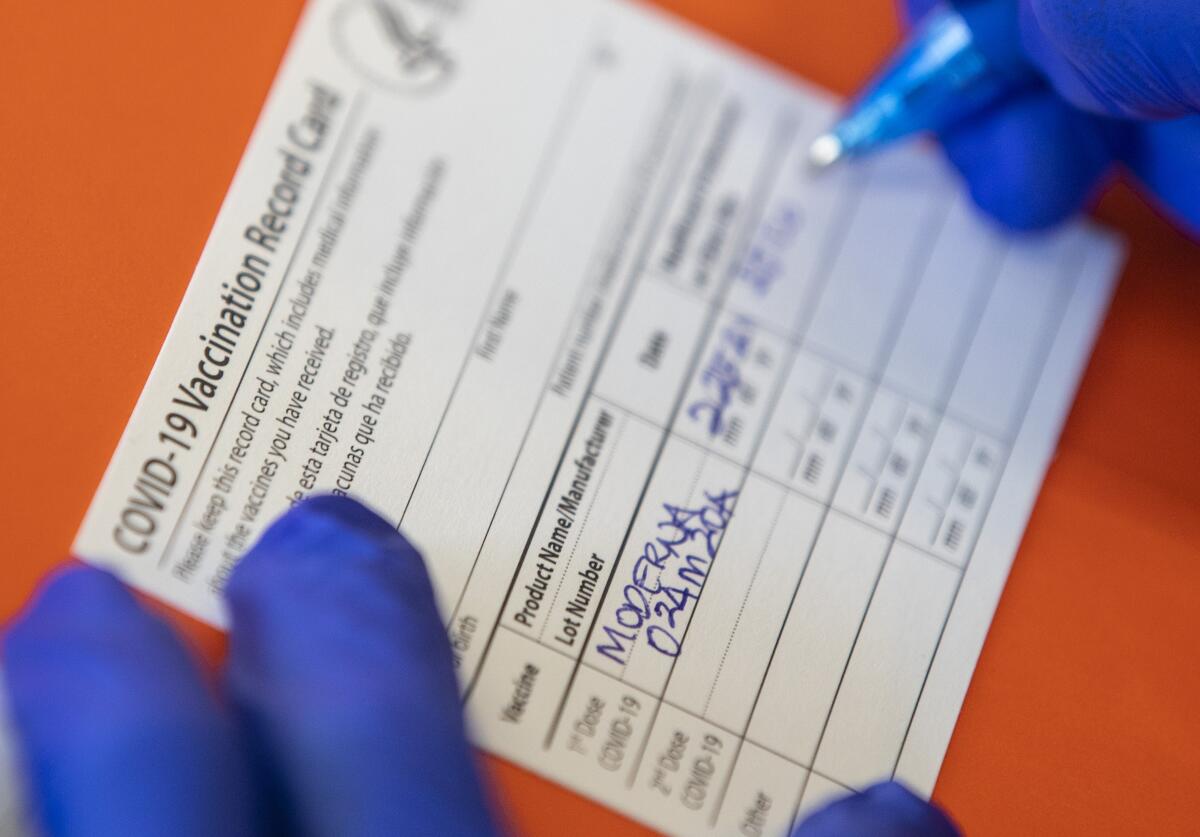Opinion: Of course there are awful vaccine disparities. This is America

- Share via
Good morning. I’m Paul Thornton, and it is Saturday, Feb. 27, 2021. We’re closing in on one year since the pandemic upended life in this country, which means right around this time in 2020, Trump administration officials were making spectacularly wrong predictions and assurances. Let’s take a look back at the week in Opinion.
Thankfully, most indications are that a combination of immunity from prior infections, vaccination and adherence to safety guidelines has finally put us on the declining slope of the pandemic — which is the most optimistic utterance I’ve made about COVID-19, in line with The Times Editorial Board’s recent assessment that the U.S. isn’t actually doing so bad on vaccination. That is, of course, the view from far, far above the ground; upon closer inspection disparities between neighborhoods, economic classes and races paint a less reassuring picture, especially in light of news that a state system set up to give preferential access to members of the hardest-hit communities has been used by white, wealthier people to get their shots.
These disparities are a feature of this pandemic, including for columnist Nicholas Goldberg, who admits to feeling pangs of jealousy and even resentment that his wife has received her two vaccine doses, and he has had none: “In a way, we’re a microcosm of the country — or of the world, really. We’re divided into haves and have-nots. In our household, she’s the have, and I’m the have-not.”
I suppose this wouldn’t be a truly American recovery if we equitably distributed a resource that we have in much greater quantities than any other country. The pandemic hasn’t changed everything after all.
Go smaller to distribute vaccine doses to the people who most need them. Columnist Robin Abcarian says there’s a solution to our equity woes hiding in plain sight: the community centers that already deliver healthcare to 1.7 million poor people in Los Angeles County. Those trusted local institutions have been inexplicably left out of the state’s distribution plan, Abcarian notes: “Let’s toss out the algorithms and the high-minded rhetoric about equitable distribution and get the vaccines to community clinics. After all, they are where the patients are.” L.A. Times
This piece on reopening schools strikes the right tone: In the New York Times, columnist Nicholas Kristof casts the continued closure of many public schools in places where Democrats govern as a failure of broader pandemic strategy rather than irrational thinking by teachers unions. He notes that in places like California, where public schools in both Los Angeles and San Francisco remain mostly closed, restaurants were serving customers before campuses were welcoming students, a stunning abrogation of all children’s rights to an education. Where he comes up short, in my view, is where almost every other take on this issue does: He doesn’t mention what underserved, largely minority public school students in hard-hit neighborhoods actually want — and there’s evidence to suggest it isn’t fully reopened classrooms. New York Times
Does Joe Biden’s base actually want a “return to normalcy”? Probably not, says columnist Jonah Goldberg: “A restoration of serenity and equipoise — which Biden hinted at in his inaugural — is the last thing the base wants from this White House. They want action of the sort they expected from Obama. Indeed, they want Obama-plus, given that the new conventional wisdom on much of the left is that the Obama years were a ‘wasted opportunity.’” L.A. Times
Enjoying this newsletter? Consider subscribing to the Los Angeles Times
Your support helps us deliver the news that matters most. Become a subscriber.
You should have the right to know who your landlord is — and by “who,” op-ed writer D. Victoria Baranetsky doesn’t mean some anonymous shell company, but those living, breathing people trying to hide their identities behind an LLC. A newly enacted California law made some progress on this front, but it didn’t go far enough because it requires disclosure only to the government, not to the public. If you want to know exactly who won’t make those repairs you desperately need or who is trying to evict you from your home, we’ll need a better law. L.A. Times
In the CIA, he studied the Islamic State group. What he learned applies to QAnon. Former CIA analyst Brent Giannotta wins the award for writing the week’s most disturbing op-ed article: “As with Islamic State, QAnon ideology proliferates through easily shareable digital content espousing grievances and injustices by evil oppressors. New QAnon believers descend down internet rabbit holes and encounter an ecosystem of fellow believers with whom they can bond and gain encouragement. Up until the assault on the Capitol, that was largely where this conspiracy-driven movement stayed. Unlike terrorist groups, QAnon believers have no established army to join or an offline program that comports to their reality. The world they inhabit exists online.” L.A. Times
Stay in touch.
If you’ve made it this far, you’re the kind of reader who’d benefit from subscribing to our other newsletters and to the Times.
As always, you can share your feedback by emailing me at [email protected].
A cure for the common opinion
Get thought-provoking perspectives with our weekly newsletter.
You may occasionally receive promotional content from the Los Angeles Times.




